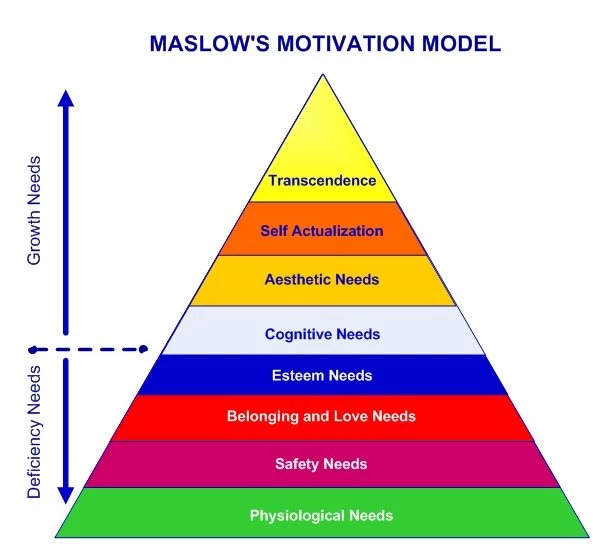Flipping Maslow's Triangle
Turning the world upside down
A while back I was talking with my friend and TED Fellow, Aziz Abu Sarah. He’s one of those friends that, as far as conversations go, is up for diving head long into the existential. In this particular conversation, I shared with Aziz an idea I had been thinking about, but hadn’t yet verbalized: flipping Maslow’s triangle. He encouraged me to share it here. That was a while ago now, but I’ve continued to think about the idea. I guess this is one of those ideas that won’t let go.
What is Maslow’s Triangle?
Maslow’s triangle (also known as Maslow’s Hierarchy of Human Motivation) is one of the more common frameworks used to attempt to understand human needs and how these needs motivate human behavior. It frames human needs as a hierarchy. Although not particularly rigid, the hierarchy attempts to explain what needs humans have, and their relationship to one another. That is, what needs need to be met before “higher” needs can be addressed. For example, the hierarchy posits that physiological needs (food, shelter, etc.) and safety needs (security, employment, health, etc.) need to be met before such higher needs as cognitive needs (knowledge and understanding, curiosity, meaning, etc.) or transcendence (a person motivated by values which transcend beyond the personal self) may be addressed.
This framework is so pervasive that it shows up as a framework behind global impact programming such as the United Nation’s Global Goals, and what problems other large scale organizations decide to address when thinking about the benefit of humanity.
As with many frameworks, Maslow continued to develop his hierarchy over the course of 30 years.
Maslow’s hierarchy began simply and focused completely on the individual, with self-actualization seated at the top of the triangle. Later Maslow expanded his hierarchy to include additional needs and included the idea of transcendence (living beyond the personal self) as the final peak.
In the past year, as I experienced the pandemic, Maslow’s triangle came to mind again. Especially in the early months, the burning question I heard was, "Who needs what, and by when?” Many were suffering, and systematic thinking seemed to be missing something that would bring peace, in the midst of the challenge. I assumed Maslow’s triangle was a functional framework, so I began searching for a different way of viewing or applying it.
That’s when I turned it upside down. What if transcendence, located at the top of the Maslow’s triangle, was instead at the bottom? What if it was the first human need? Not bread or shelter. Would that then fulfill the rest of the triangle? In all my personal interactions, and things I could observe during the pandemic, it was relational connection (the social fabric) that looked like the key to the fulfillment of any other need. Whether through grass roots, mutual aid, a church ministry, or another kind of organized structure, I saw interpersonal relationship and acting on a set of values that elevates caring for others (the ethic of “Love thy neighbor as thyself”), having the highest impact.
This thought seems to line up with the radical proposition of Jesus Christ, saying that we should seek the Kingdom of God and His righteousness and all these things (our human needs) shall be added to you (Matthew 6:33). There are many questions that may arise from this proposition. What is the Kingdom of God and God’s righteousness? What does it look like to seek the Kingdom of God? What does this look like for those experiencing immense challenges? For those who don’t have the time, energy, or resources? How exactly do “all these things” get added if we are not seeking them directly?
As I continue to think through all of this it seems that Maslow took transcendence to be a luxury. The kind of thing that only humans with enough time, energy, and resources could pay attention to. But what would the world be like if transcendence was esteemed as a first order need? What if we began thinking that living beyond the personal self was as important as bread (if not more)?




Have you consideted David Hawkins … specifically his scale in Power vs Force…